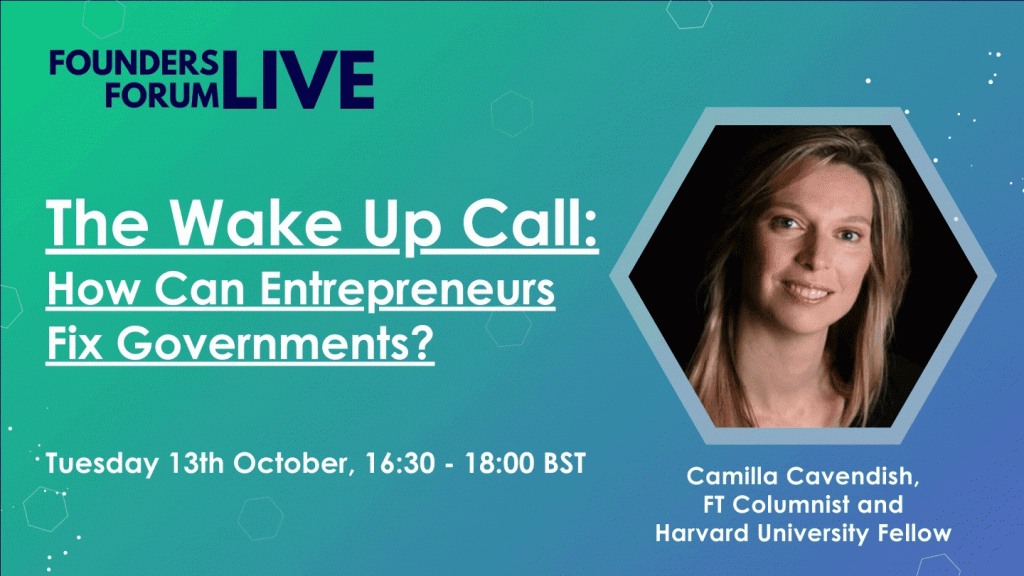Last updated on January 21, 2025
On October 13th, Founders Forum hosted the third session in our second season of FF Live, “The Wake-Up Call: How Can Entrepreneurs & Innovation Fix Government?”.
Panellists included John Micklethwait, Editor-in-Chief, Bloomberg News and Adrian Wooldridge, Political Editor, The Economist. The discussion was led by Camilla Cavendish, FT Contributor and Harvard University Fellow.
The discussion centred on how Covid-19 has exposed the flaws of government in Europe and the US, and how greater collaboration with entrepreneurs and technology can play a role in fixing numerous issues.

We would like to offer our thanks to all involved for generously giving their time, alongside the attendees to the session for their contributions.
Notable attendees included Megan Smith, Founder & CEO, shift7 / former CTO to President Obama; Toomas Hendrik Ilves, former President of Estonia; Daniel Korski, Founder & CEO, Public / former Special Advisor to David Cameron; Lord Peter Mandelson, President, Policy Network / Life Peer, House of Lords; and Andrew Griffith, MP for Arundel and South Downs / former Chief Business Adviser to Boris Johnson.
. . .
On the digital illiteracy of government
“Today, our lawmakers have virtually no clue about what is actually happening in tech: the result you get is a bifurcation [of government into digital and non-digital]” – Toomas Hendrik Ilves, former President of Estonia
Governments need to stop viewing digital as a separate tool, and instead look to digitise all internal processes in collaboration with those who understand technology
- Government is stuck in a cycle of technical ineptitude: in order to break this, it is crucial to have politicians who understand tech and the core elements of digital governance, such as secure digital identity and architecture
- The Estonian government began digitising schools in the 90s, and is now at the stage of using blockchain technology to encrypt and protect all critical data, ensuring national data integrity (which, it was argued, is likely far more important than mere privacy)
- Technology is not a substitute for good policy, but rather an instrument for it: good policy comes from politicians and civil servants working together to find a solution with a long-term focus
On public-private innovation partnerships
“If you think more like a venture capitalist, scout and scale, you will find innovators on this planet already fixing almost everything we face” – Megan Smith, Founder & CEO, shift7 / former CTO to President Obama
“Government needs to get better at procuring against a problem statement” – Andrew Griffith, MP for Arundel and South Downs / former Chief Business Adviser to Boris Johnson
Rather than attempting to solve problems internally, governments could and should look to the market – there are likely innovators already engaging with these issues
- It would be prudent for government to scout and scale: scout for those already solving the problem, and scale their solution to a national level
- It is important to note the necessity of looking for innovators across all genders, geographies, and societies to create a representative, unbiased set of solutions
On the entrepreneurial elite engaging with government
“On the whole, the new elite are not as involved in governments as the old elite were” – John Micklethwait, Editor-in-Chief, Bloomberg News
“People in the tech industry have far too little interest of concern, or even awareness, of social, political, and ethical issues other than their bottom line” – Toomas Hendrik Ilves, former President of Estonia
The modern entrepreneurial elite play a considerably smaller role in government than the elites of the past
- In Silicon Valley and elsewhere there is a general sense of having succeeded in spite of the public sector and regulators, and a broadly combative attitude towards government
- Government tech-illiteracy could be remedied by a more collaborative relationship with tech giants and their superstar founders
- There are five times more people aged over 60 working in tech departments in the US government compared to those aged under 30, showing the lack of interest of the younger generations working alongside the government
- Participants also made a case for reintroducing non-military national service: to bring in young, clever people who understand tech; and to bind people together from all social background, to form a representative government
On long-term vs short-term thinking in government
“Civil servants are overly focused on short term risk, and therefore open up real problems for long term” – Daniel Korski, Founder & CEO, Public / former Special Advisor to David Cameron
“One of the things that mitigates against taking risk, ironically, is not true experimentation but initiatives for the sake of taking initiatives” – Andrew Griffith, MP for Arundel and South Downs / former Chief Business Adviser to Boris Johnson
Governments should consider long term risk as opposed to short term risk, particularly when it comes to the procurement of goods and services
- The large number of long-running public-sector failures, an inherently risk-averse civil service, and reputation-driven retirement benefits for ex-ministers all contribute to risk aversion in government
- While the policy function of government is rightly risk averse, the commercial function (responsible for the procurement of goods and services) should consider risk in terms of the long term effects on society when signing off contracts
- This could be achieved by bringing in those with commercial intelligence to ultimately sign off commercial government contracts
. . .
#FFLive is a digital series bringing you weekly virtual events to recreate the magic of Founders Forum wherever we are in the world. For more information on the FF Live series follow us on LinkedIn and sign up to Founders News – a weekly smart newsletter delivering the latest stories about today’s most inspiring entrepreneurs.
 All Posts
All Posts


